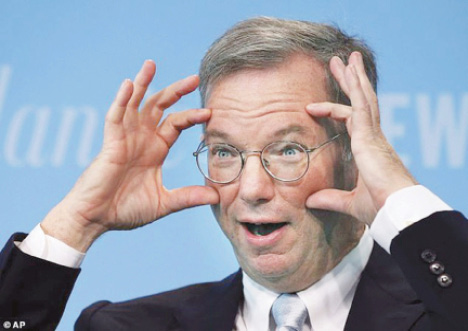Internet will ‘split in two’ by 2028 – former Google CEO
The internet will be divided into two different worlds within the next decade – and China will lead one of them, according to ex-Google CEO Eric Schmidt. The 63-year-old multi-billionaire says the censorship and control the Chinese government wields over its citizens’ online access means it is incompatible with the democratic internet of the west. […]

Former Google CEO, Eric Schmidt.
The internet will be divided into two different worlds within the next decade – and China will lead one of them, according to ex-Google CEO Eric Schmidt.
The 63-year-old multi-billionaire says the censorship and control the Chinese government wields over its citizens’ online access means it is incompatible with the democratic internet of the west. This means there will be two distinct versions of the world wide web by 2028, one run by China and the other by the US.
The process is already happening, with the so-called Great Firewall of China blocking Chinese citizens from accessing several of the internet’s most popular websites, including Facebook and YouTube. Instead, Chinese equivalents such as search engine Baidu offer the web services of their banned western equivalents.
Schmidt, who is worth an estimated $14 billion (£10.6 billion), made the comments while speaking at a private technology conference in San Francisco hosted by Village Global VC on Wednesday.
He said the internet will likely have two clear and separate voices, rather than mass fragmentation worldwide.
‘I think the most likely scenario now is not a splintering, but rather a bifurcation into a Chinese-led internet and a non-Chinese internet led by America,’ Schmidt said.
‘If you look at China, and I was just there, the scale of the companies that are being built, the services being built, the wealth that is being created is phenomenal.
‘Chinese Internet is a greater percentage of the GDP of China, which is a big number, than the same percentage of the US, which is also a big number.’
Schmidt added that he expects to see goods and service grow offered through the web grow exponentially in China. But Beijing’s hardline rule is unlikely to waver, forcing it to lead its own version of the internet to maintain its tough stance on censorship.
‘I think you’re going to see fantastic leadership in products and services from China,’ Schmidt said.
‘There’s a real danger that along with those products and services comes a different leadership regime from government, with censorship, controls, etc.’
The former Google executive, who worked at the company for 17 years from 2001 to 2017, regularly comments on the future of technology and his predictions for how it will shape the world.
Schmidt revealed in January that he is ‘very concerned’ with Russia and China’s lead in the race on artificial intelligence.
